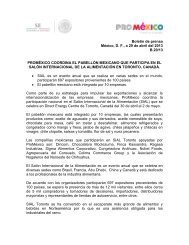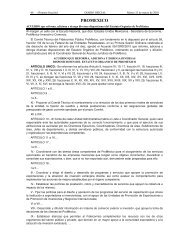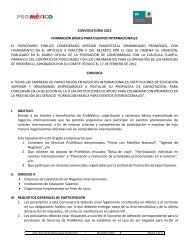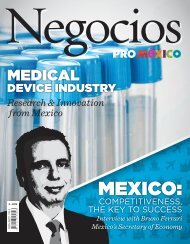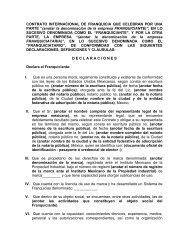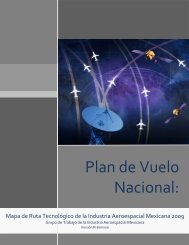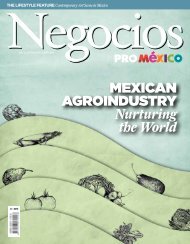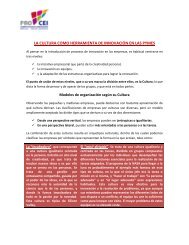mexico renews itself - ProMéxico
mexico renews itself - ProMéxico
mexico renews itself - ProMéxico
You also want an ePaper? Increase the reach of your titles
YUMPU automatically turns print PDFs into web optimized ePapers that Google loves.
18 Negocios ProMéxico Negocios ProMéxico 19<br />
Mexico<br />
and<br />
Renewable<br />
Energy<br />
The United Nations (UN) General Assembly declared 2012 the<br />
International Year for Sustainable Energy for All with Resolution<br />
65/151. As such, this year has become a valuable opportunity for<br />
raising awareness about the need to increase sustainable access to<br />
energy, energy efficiency and renewable energy in the local, national,<br />
regional and international spheres.<br />
____<br />
by maría cristina rosas*<br />
photo courtesy of siemens<br />
Energy services have a profound effect on productivity,<br />
health, education, climate change, food and water<br />
security and communication services in all societies.<br />
Therefore, the lack of access to non-polluting, affordable<br />
and reliable energy may impede social and economic development<br />
and constitute an important barrier for complying with<br />
the Millennium Development Goals set by the UN, which must<br />
be met by 2015.<br />
At present, nearly 1.4 billion people do not have access to modern<br />
energy, while approximately 3 billion depend on traditional<br />
biomass and coal as their main power sources. Today, we know<br />
that these types of energy sources are finite and will be exhausted<br />
in the near future, which poses serious challenges for global societies.<br />
They are also contaminating energies that compromise<br />
compliance with international commitments designed to reduce<br />
the greenhouse effect. In this sense, the international community<br />
is increasingly emphasizing the need to have renewable energy<br />
that may meet humanity’s power needs in a sustainable way.<br />
Renewable energy is the term applied to what is obtained<br />
from virtually inexhaustible natural resources. Some are characterized<br />
by the enormous amount of energy they contain, while<br />
others are able to regenerate themselves naturally. Renewable<br />
energy sources may be divided into two categories: non-contaminating<br />
or clean, and contaminating. The first category includes<br />
the sun, the wind, rivers and freshwater currents, waves, sea and<br />
ocean currents, the earth’s heat and hydrogen.<br />
Contaminating sources are obtained from organic material<br />
or biomass, and may be used directly as fuel (wood or other solid<br />
plant material), or converted into bioethanol or biogas through<br />
organic fermentation processes, or into biodiesel, through the<br />
transesterification reactions of urban waste.<br />
Energy from contaminating renewable sources has the same<br />
problem as the one produced by fossil fuels: carbon dioxide –a<br />
greenhouse gas– is released through its combustion and is often<br />
more contaminating, because the combustion is not as clean, releasing<br />
soot and other solid particles. However, they are categorized<br />
as renewable energy sources because the released carbon<br />
dioxide may be used for the next generation of organic material.<br />
Energy may also be obtained from urban solid waste, which is<br />
also a contaminant.<br />
Renewable energy offers advantages that are often unappreciated.<br />
Unlike fossil fuels, renewable sources offer a long term<br />
guarantee of stability in energy prices. A price premium must be<br />
paid in order to obtain similar coverage (or hedging) for a fuel.<br />
In fact, hedging for terms as long as those offered by renewable<br />
source technologies (often 25 years or more), does not exist in<br />
the market. This means that renewable energy offers practically<br />
free hedging.<br />
In the social sphere, technologies that use renewable energy<br />
sources promote sustainable regional development with permanent<br />
and better paid employment. They also contribute to improving<br />
quality of life in isolated and highly marginalized areas.



